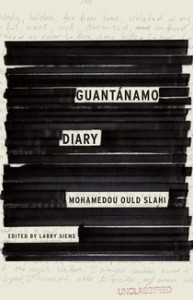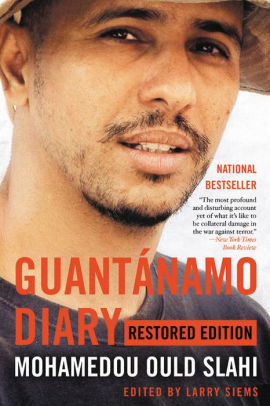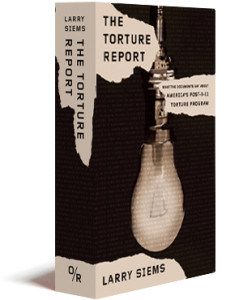 “A vision of hell, beyond Orwell, beyond Kafka: perpetual torture prescribed by the mad doctors of Washington.”
“A vision of hell, beyond Orwell, beyond Kafka: perpetual torture prescribed by the mad doctors of Washington.”
— John le Carré
“Anyone who reads Guantánamo Diary — and anyone with a shred of conscience should do so, now — will be ashamed and appalled. Mohamedou Ould Slahi’s demand for simple justice should be our call to action. Because what’s at stake in this case is not just the fate of one man who, against all odds, managed to tell his story, but the future of our democracy as well.”
— Glenn Greenwald
** Watch film, hear readings, and read full Guardian coverage at guantanamodiary.com **
** See News and Reviews for latest reviews of Guantánamo Diary **
In the summer and fall of 2005, in an isolation hut in Guantánamo, Mohamedou Ould Slahi handwrote a memoir of what he calls his “endless world tour” of detention and interrogation — an odyssey that began when he turned himself in for questioning in his native Mauritania in November 2001, and included renditions to Jordan, then to Bagram in Afghanistan, and finally to Guantánamo, where he was subjected to one of the most stubborn, deliberate, and cruel Guantánamo interrogations on record.
For almost seven years, the U.S. government held the 466-page manuscript as a classified secret. It continues to hold Mohamedou Ould Slahi himself, although the federal judge who heard his habeas corpus petition in 2010 ordered him released, and although he has never been charged with any crime.
This January, the world will at last be able to read Mohamedou Ould Slahi’s story in his own words, when Little Brown in the United States, Canongate in the United Kingdom, and publishers in eleven other countries will publish Mohamedou Ould Slahi’s Guantánamo Diary.
Were it nothing more than a first-person account of his incarceration, it would be a remarkable book: there are no other such first-hand, inside accounts of the life of a long-term GTMO prisoner. That it happens to be the account of a detainee identified—mistakenly, there is no longer any doubt—as a major 9/11 conspirator and targeted for one of the prison’s most brutal interrogations ensures that it will have a central and permanent place in the literature of this troubling chapter of American history. But what moves Guantánamo Diary beyond testimonial and witness literature and into a wider realm of literature altogether is Slahi himself—not as character in America’s post-9/11 drama, but as writer, a writer with a keen eye, a full emotional register including indomitable humor, and an astonishingly accessible and prepossessing voice. That voice is propelled by a singular, humane purpose: “to be as fair as possible,” as he wrote, “to the U.S. Government, to my brothers, and to myself.”
As I wrote in Slate last year, “Slahi’s writing is much more than a litany of abuses. It is driven by something much deeper: not just the desire to be fair, as he puts it, but to understand his guards, his interrogators, and his fellow detainees, and to show that even the most dehumanizing situations are composed of individual, and at times harrowingly intimate, human exchanges. The result is an account that is both damning and redeeming.”
Guantánamo Diary is available now in the United States (Hachette), the United Kingdom (Canongate), Norway (Cappelen Damm), France (Michel Lafon), the Netherlands (de Boekerij), Italy (Piemme), Germany (Klett/Tropen), Finland (Like), Slovak Republic (Tatran), Croatia (Profil), Denmark (Art People), Portugal (20/20 Editora), Sweden (Norstedts), Turkey (Belge), Czech Republic (Jota), Greece (Psichogios), Brazil (Companhia das Letras), Indonesia (Noura), Serbia (Laguna), Lebanon (Dar al-Saqi), Mexico (Planeta), Bosnia (Buybook), Japan (Kawada Shobo), Croatia (Profil Knjiga), Spain (Agora), Czech Republic (Jota Nakladatelstvi), and Poland (Muza), and forthcoming in Russia (AST), Romania (Corint), and Hungary (Maxim)
 On October 16, 2017, the first anniversary of Mohamedou Ould Slahi’s release, Hachette (U.S.) and Canongate (U.K.) will release a new RESTORED edition of Guantánamo Diary. Order information is here.
On October 16, 2017, the first anniversary of Mohamedou Ould Slahi’s release, Hachette (U.S.) and Canongate (U.K.) will release a new RESTORED edition of Guantánamo Diary. Order information is here.




